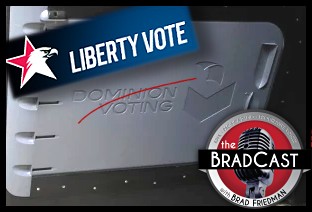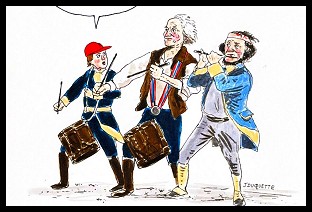[UPDATE 10/30/10: The North Carolina Republican Party has both filed and won their suit against the State Board of Elections. See details at end of article for more.]
 It would have been nice if these guys had spoken up years ago, when the bulk of the Republican Party and their sympathizers were labeling Democrats as "conspiracy theorists" and "sore losers" for their documented complaints of touch-screen voting systems flipping votes on screen to Republican candidates. But better late than never, we suppose.
It would have been nice if these guys had spoken up years ago, when the bulk of the Republican Party and their sympathizers were labeling Democrats as "conspiracy theorists" and "sore losers" for their documented complaints of touch-screen voting systems flipping votes on screen to Republican candidates. But better late than never, we suppose.
This afternoon, Legal Counsel for the North Carolina Republican State Executive Committee sent a letter [PDF] to the NC State Board of Elections threatening legal action if their "demands" were not "immediately" met for taking a number of specific actions to mitigate reported touch-screen voting problems describes as "significantly more widespread than the NC GOP initially understood."
The GOP attorney, John E. Branch III writes that the voting system problems should have been addressed prior to the early voting period "and, to the extend they were not, the touch screen systems should have been banned."
The problems in contention are related to reports of the state's ES&S iVotronic e-voting systems reportedly showing votes as flipping from Republicans to Democrats on the screen. The threat from the state GOP comes on the heels of complaints made last week in two different NC counties, Craven and New Hanover. Those reports were a switch from previous years when voters in dozens of states had reported votes flipping largely from Democratic to Republican.
Branch charges that the party has "received word" that similar problems have emerged in "Mecklenburg...Randolph...Cumberland, Wilson, Pender, Forsyth, Lenoir and other counties," which all similarly use the oft-failed, 100% unverifiable ES&S touch-screen voting machines. The same systems are also used in more than a dozen other states...
While The BRAD BLOG has filed, quite literally, hundreds if not thousands of pages of coverage detailing ES&S failures over the years, we summarized many of the most notable and disastrous instances (along with ill-conceived "solutions" and election official denial) related to these problems, following a similar report which emerged out of Texas late last week. That story was based on cellphone video taken of an attempted Republican vote for governor seen flipping to a straight-ticket Green Party vote on an ES&S iVotronic in Dallas County.
(Also, see our "(Very) Brief History of Recent ES&S Failure" written after the same iVotronic systems in South Carolina inexplicably reported the unknown Alvin Greene as the "winner" of that state's Democratic U.S. Senate primary last June.)
In a sharply worded response [PDF] to Branch's letter late this afternoon, Gary O. Bartlett, Executive Director of the State Board of Elections charges the GOP letter was "apparently intended to elevate isolated occurrences with touch screen voting equipment into a crisis of confidence in the integrity of the election." Bartlett downplayed the concerns, as elections officials usually do, describing them as "no different than ones that must be addressed in every election."
North Carolina Election Integrity advocate Joyce McCloy, Director of NC Coalition for Verified Voting and editor of Voting News tells The BRAD BLOG that vote flipping in the state "has historically been from GOP to DEM". She also notes the acrimony between the state Republicans and the Board of Elections, explaining that many of the county BoEs have a Democratic majority and that the state's largest local e-voting vendor, Print Elect, who program the machines in a number of counties, is a "BIG donor to the DEM Governor".
In a report this afternoon from WRAL, Johnnie McCLean, deputy director of the State Board of Elections, also says they've received only "isolated" complaints from Craven and New Hanover, but adds that some were complaints of Democrats who said their votes flipped to Republican candidates.
The standoff, McCloy tells us, is indeed likely to result in a lawsuit before the week is out, as both the state GOP as well as the BoE, offered problematic points in their charges and counter charges.
In his response to Branch, Bartlett suggests many of the GOP attorney's allegations are unfounded: "Your letter implies that you have accumulated a list of equipment performance problems you have not chosen to share with elections officials," he wrote. "Unless you identify concerns with specificity there is no way that they can be properly addressed. We have already addressed every concern you have brought to our attention."
Both the Board and the GOP seem to believe the reported problems are related to "calibration" of the touch-screen systems and Bartlett notes the systems are now re-calibrated every day before polls open.
In our report on last week's Texas incident, we detailed the danger --- insanity, really --- of allowing touch-screen voting systems to be recalibrated by county employees in the middle of an election. While "re-calibration" is the "solution" most often carried out by officials in response to such instances, even though it allows an excellent opportunity for voting system manipulation, removing and quarantining the failed systems would be more appropriate, according to computer science and security experts we've discussed the matter with.
Bartlett also writes to Branch that summary screens at the end of the voting process allow voters "an opportunity to review their ballots to make sure their votes had been properly recorded before their ballots were actually cast."
In truth, however, there is no way to know how any touch-screen voting machine actually records a vote during an election. What is shown to voters on both the screen and the so-called "paper trail" printed out along side it (on many such systems) may not reflect the way the votes are actually recorded internally. To that end, there is no way to know that any vote has ever been recorded accurately, as per any voters intent, for any candidate or initiative on any ballot in any actual election using a touch-screen voting machine.
Moreover, Bartlett snapped at Branch that "[I]t must be noted that the current iVotronic equipment about which you profess deep concern has been nationally certified and is used in voting jurisdictions through the United States."
The ES&S iVotronics were indeed certified at the federal level, but by contractors selected and paid for by the vendor themselves and who tested the systems in secrecy. Subsequent independent analysis, by a number of states, have found "serious" flaws in the systems.
A study released by the state of Florida in 2007 found the systems were vulnerable to viral vote-flipping attacks. The state eventually decertified the systems after 18,000 votes were lost all together during a 2006 U.S. House special election decided in favor of the Republican by just 369 votes.
In Colorado, the iVotronic was decertified after an analysis carried out by then Secretary of State Mike Coffman, a Republican, found the system "failed because it is easily disabled by voters." At a press conference announcing the findings he noted that "if you were to put a magnet in close proximity or inside the port...that would, in fact, disable that particular voting machine and it would have to be literally reprogrammed...to bring it back into circulation for that election."
In Ohio in 2007, the Democratic Secretary of State Jennifer Brunner, after the largest independent study of its kind, recommend the ES&S iVotronic, as well as the state's other "nationally certified" Direct Recording Electronic (DRE, usually touch-screen) voting systems no longer be used. "To put it in every-day terms," Brunner said when the study was released, "the tools needed to compromise an accurate vote count could be as simple as tampering with the paper audit trail connector or using a magnet and a personal digital assistant."
Finally, NC's Election Integrity advocate McCloy points us to this 2008 Bard College study of data from North Carolina's 2008 Presidential Election finding that "voters are more likely to have their vote counted accurately on a voter marked paper ballot" rather than a touch-screen system. She also notes, as other studies have found, that the so-called "paper trail" printers on DRE devices "are unreliable" and "fail to print up to 9% of the time".
One of the "DEMANDS" listed in the GOP attorney's letter to the State Board of Elections is for an order to be issued requiring poll workers to keep a record of complaints (which Bartlett says they already do), but to include "the identify of the voter, the time the voter voted, the specific voting machine used by the voter, and the nature of the voter's complaint" in such incident reports.
Such a requirement, however, would likely result in the loss of privacy for that voter's secret ballot. That's just one more problem to add to the ever growing list of reasons why, as the GOP's Branch correctly noted, "the touch screen systems should have been been banned."
In addition to North Carolina, the ES&S iVotronic is used, according to VerifiedVoting.org's database at polling places in Arkansas, Washington D.C., Florida, Indiana, Kansas, Kentucky, Missouri, Mississippi, New Jersey, Ohio, Pennsylvania, South Carolina, Tennessee, Texas, Virginia, Wisconsin, and West Virginia.
• 10/28/10 Letter from NC GOP to NC's State Board of Elections [PDF]
• 10/28/10 Response to NC GOP from NC's State Board of Elections [PDF]
UPDATE 10/29/10: The North Carolina Republican Party has filed suit against the State Board of Elections "alleging that touch-screen machines are thwarting voters trying to cast ballots for GOP candidates," according to AP's coverage now here...]
UPDATE 10/30/10: Federal judge rules in favor of NC GOP in expedited hearing. Full details now here...


 Sunday 'Close Enough' Toons
Sunday 'Close Enough' Toons A Pretty Weak 'Strongman': 'BradCast' 10/30/25
A Pretty Weak 'Strongman': 'BradCast' 10/30/25 'Green News Report' 10/30/25
'Green News Report' 10/30/25
 Proposal for 'First Politically Viable Wealth Tax' Takes Shape in CA: 'BradCast' 10/29/25
Proposal for 'First Politically Viable Wealth Tax' Takes Shape in CA: 'BradCast' 10/29/25 Monster Storm, Endless Wars, Gamed Elections:
Monster Storm, Endless Wars, Gamed Elections: 'Green News Report' 10/28/25
'Green News Report' 10/28/25 Let's Play 'Who Wants
Let's Play 'Who Wants Sunday 'Cartoonists Dilemma' Toons
Sunday 'Cartoonists Dilemma' Toons Exiled NOAA Scientists Resurrect Critical Disaster Database: 'BradCast' 10/23/25
Exiled NOAA Scientists Resurrect Critical Disaster Database: 'BradCast' 10/23/25  'Green News Report' 10/23/25
'Green News Report' 10/23/25 Trump-Allied GOP Partisan Buys Dominion Voting Systems: 'BradCast' 10/22/25
Trump-Allied GOP Partisan Buys Dominion Voting Systems: 'BradCast' 10/22/25 Trump, Republican Law(lessness) & (Dis)Order: 'BradCast' 10/21/25
Trump, Republican Law(lessness) & (Dis)Order: 'BradCast' 10/21/25 'Green News Report' 10/21/25
'Green News Report' 10/21/25 Celebrating 'No Kings': 'BradCast' 10/20/25
Celebrating 'No Kings': 'BradCast' 10/20/25 Sunday 'How It Started' Toons
Sunday 'How It Started' Toons SCOTUS Repubs Appear Ready to Gut Rest of Voting Rights Act: 'BradCast' 10/16/25
SCOTUS Repubs Appear Ready to Gut Rest of Voting Rights Act: 'BradCast' 10/16/25 'Green News Report' 10/16/25
'Green News Report' 10/16/25 The 'Epstein Shutdown' and Other Autocratic Nightmares: 'BradCast' 10/15/25
The 'Epstein Shutdown' and Other Autocratic Nightmares: 'BradCast' 10/15/25 Group Vows to Block MO's GOP U.S. House Gerrymander: 'BradCast' 10/14/25
Group Vows to Block MO's GOP U.S. House Gerrymander: 'BradCast' 10/14/25 Trump Labor Dept. Warns Trump Policies Sparking Food Crisis: 'BradCast' 10/9/25
Trump Labor Dept. Warns Trump Policies Sparking Food Crisis: 'BradCast' 10/9/25 Trump's Losing Battles: 'BradCast' 10/8/25
Trump's Losing Battles: 'BradCast' 10/8/25 Trump, Roberts and His Stacked, Packed and Captured SCOTUS: 'BradCast' 10/7/25
Trump, Roberts and His Stacked, Packed and Captured SCOTUS: 'BradCast' 10/7/25 Trump Attempting His 'Invasion from Within': 'BradCast' 10/6/25
Trump Attempting His 'Invasion from Within': 'BradCast' 10/6/25 Biden Budget Expert: Mass Firings in Shutdown 'Illegal': 'BradCast' 10/2/25
Biden Budget Expert: Mass Firings in Shutdown 'Illegal': 'BradCast' 10/2/25 Why is DOJ Suing 'Blue' States for Their Voter Databases?: 'BradCast' 10/1/25
Why is DOJ Suing 'Blue' States for Their Voter Databases?: 'BradCast' 10/1/25
 VA GOP VOTER REG FRAUDSTER OFF HOOK
VA GOP VOTER REG FRAUDSTER OFF HOOK Criminal GOP Voter Registration Fraud Probe Expanding in VA
Criminal GOP Voter Registration Fraud Probe Expanding in VA DOJ PROBE SOUGHT AFTER VA ARREST
DOJ PROBE SOUGHT AFTER VA ARREST Arrest in VA: GOP Voter Reg Scandal Widens
Arrest in VA: GOP Voter Reg Scandal Widens ALL TOGETHER: ROVE, SPROUL, KOCHS, RNC
ALL TOGETHER: ROVE, SPROUL, KOCHS, RNC LATimes: RNC's 'Fired' Sproul Working for Repubs in 'as Many as 30 States'
LATimes: RNC's 'Fired' Sproul Working for Repubs in 'as Many as 30 States' 'Fired' Sproul Group 'Cloned', Still Working for Republicans in At Least 10 States
'Fired' Sproul Group 'Cloned', Still Working for Republicans in At Least 10 States FINALLY: FOX ON GOP REG FRAUD SCANDAL
FINALLY: FOX ON GOP REG FRAUD SCANDAL COLORADO FOLLOWS FLORIDA WITH GOP CRIMINAL INVESTIGATION
COLORADO FOLLOWS FLORIDA WITH GOP CRIMINAL INVESTIGATION CRIMINAL PROBE LAUNCHED INTO GOP VOTER REGISTRATION FRAUD SCANDAL IN FL
CRIMINAL PROBE LAUNCHED INTO GOP VOTER REGISTRATION FRAUD SCANDAL IN FL Brad Breaks PA Photo ID & GOP Registration Fraud Scandal News on Hartmann TV
Brad Breaks PA Photo ID & GOP Registration Fraud Scandal News on Hartmann TV  CAUGHT ON TAPE: COORDINATED NATIONWIDE GOP VOTER REG SCAM
CAUGHT ON TAPE: COORDINATED NATIONWIDE GOP VOTER REG SCAM CRIMINAL ELECTION FRAUD COMPLAINT FILED AGAINST GOP 'FRAUD' FIRM
CRIMINAL ELECTION FRAUD COMPLAINT FILED AGAINST GOP 'FRAUD' FIRM RICK SCOTT GETS ROLLED IN GOP REGISTRATION FRAUD SCANDAL
RICK SCOTT GETS ROLLED IN GOP REGISTRATION FRAUD SCANDAL VIDEO: Brad Breaks GOP Reg Fraud Scandal on Hartmann TV
VIDEO: Brad Breaks GOP Reg Fraud Scandal on Hartmann TV RNC FIRES NATIONAL VOTER REGISTRATION FIRM FOR FRAUD
RNC FIRES NATIONAL VOTER REGISTRATION FIRM FOR FRAUD EXCLUSIVE: Intvw w/ FL Official Who First Discovered GOP Reg Fraud
EXCLUSIVE: Intvw w/ FL Official Who First Discovered GOP Reg Fraud GOP REGISTRATION FRAUD FOUND IN FL
GOP REGISTRATION FRAUD FOUND IN FL

































